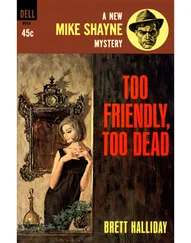Dan Fesperman - Lie in the Dark
Здесь есть возможность читать онлайн «Dan Fesperman - Lie in the Dark» весь текст электронной книги совершенно бесплатно (целиком полную версию без сокращений). В некоторых случаях можно слушать аудио, скачать через торрент в формате fb2 и присутствует краткое содержание. Жанр: Триллер, на английском языке. Описание произведения, (предисловие) а так же отзывы посетителей доступны на портале библиотеки ЛибКат.
- Название:Lie in the Dark
- Автор:
- Жанр:
- Год:неизвестен
- ISBN:нет данных
- Рейтинг книги:3 / 5. Голосов: 1
-
Избранное:Добавить в избранное
- Отзывы:
-
Ваша оценка:
- 60
- 1
- 2
- 3
- 4
- 5
Lie in the Dark: краткое содержание, описание и аннотация
Предлагаем к чтению аннотацию, описание, краткое содержание или предисловие (зависит от того, что написал сам автор книги «Lie in the Dark»). Если вы не нашли необходимую информацию о книге — напишите в комментариях, мы постараемся отыскать её.
Lie in the Dark — читать онлайн бесплатно полную книгу (весь текст) целиком
Ниже представлен текст книги, разбитый по страницам. Система сохранения места последней прочитанной страницы, позволяет с удобством читать онлайн бесплатно книгу «Lie in the Dark», без необходимости каждый раз заново искать на чём Вы остановились. Поставьте закладку, и сможете в любой момент перейти на страницу, на которой закончили чтение.
Интервал:
Закладка:
No realm of state machinery was beyond such talents. Garovic had been a personnel manager at the state-run brewery, an “intergovernmental liaison” at the municipal waterworks, a midlevel administrator at the Ministry of Housing, and a functionary of vague but supremely self-important duties at the Ministry of Justice. That was the beauty of the state having its fingers in so many enterprises. With the right combination of blandly mediocre qualifications one could work almost anywhere.
A few months after the war began he had materialized one morning in the glass-caged office of the chief of detectives. His predecessor, a gruff but competent Zijad Imamovic, had fought in the defense of the city only to be killed by a mortar shell, blown all over the walls of a building near the front line.
Imamovic had been the only boss Vlado had known in his four years as a homicide investigator. He’d been a deliberate man who counseled professionalism and thoroughness. He’d been determined that each case would be conducted by the book, no matter how insignificant or meaningless it seemed, and he’d drained every last ounce of his budget to send his three investigators off for weeks at a time to pick up the proper training. Vlado had envisioned a future in which he would learn his trade inside out, with no case he couldn’t handle. Then the war had come, taking Imamovic and those hopes with it.
It had taken Garovic only a few minutes to settle behind Imamovic’s gray metal desk as if he’d never worked anywhere else and, by the time Vlado and Damir had arrived, he’d tacked a picture of his family on the wall, spread a sheaf of case files before him, and was enveloped in a cloud of cigarette smoke. It was as fine an imitation of businesslike efficiency as Vlado had ever seen, and it fooled everyone until at least mid-afternoon.
Garovic was of medium height, with a soft, pale body spreading in the middle like a melting pat of butter. Lank, black hair was combed straight back over a broad face, and his skin was white and puffy from a lifetime of cabbage, beer and potatoes. He was among the few in Sarajevo who’d managed to gain weight during the war. His eyes, which seemed to blink constantly, were the gray-green of weak broth, and he spoke in the high, crackling voice of a bird used to being heard amid great chattering flocks.
There was nothing Garovic cherished more than the order and tranquillity of business as usual, especially amid the chaos and clutter of war. And in the case of a murdered chief of the Interior Ministry’s special police, he sensed the disturbing tug of a whirlpool.
He decided right away to swim for open water.
“Not our jurisdiction, not even close,” he said, shaking his head vigorously as he reached Vlado’s desk. “And just to make sure, I phoned the Interior Ministry an hour before you arrived. They agree, of course.”
His face was flushed, as if he’d just run a race. He stooped across the back of Vlado’s desk, his white hands poking through the unruly pile of books and papers. Vlado watched the invasion without expression, leaning back in his chair, arms folded across his chest. Then Garovic found what he’d come for. He held aloft the pale green folder with the report from the night before.
“Vitas, Esmir,” he chirped triumphantly, reading the block lettering. “An interesting case, no doubt. Who, indeed, would murder the most powerful law enforcement officer in the city? Something to speculate about while you’re painting your next regiment, Vlado.”
Damir must have blabbed about the soldiers.
“But now it’s officially none of your business. Or mine.”
“Whose business is it then? Officially?” Vlado asked, although he knew the answer.
“Interior’s special police. Dead or alive, he’s their boy.”
The expanding realm of the special police had become an endless source of frustration and fascination for Vlado. At first he had only been annoyed, watching the city’s most interesting cases slide across the river to this hybrid at a time when he could have been learning from the experience. It was one part police force, one part army, and a third part secret intelligence service. Some people liked to say a fourth part was the largest-the mafia part, with a complex web spreading to every gang of smugglers and black marketeers in the city, reaching even into the hills of the Serbs. It was hard to say how much of the speculation was true, if any.
Such uncertainty was inevitable in a city that owed its survival to private bands of armed thugs. When the Serbs were poised to rush across the bridges and overrun every main road during the first weeks of fighting, it was the outlaws-thieves, loan sharks, racketeers, and their various enforcers-who had rallied the defense, arming and organizing just enough people to fight off the advancing tanks with little more than pistols and machine guns. Vlado had to hand it to them. They’d fought like tigers, rescuing museums, hospitals, banks, government buildings, and the entire city center. If along the way they’d helped themselves to some of the contents of these buildings, or set up supply networks that filled their own pockets as much as they filled the stomachs of Sarajevans, well, who was going to complain?
But once the Serbs were dug in around the city and it became clear no one was leaving anytime soon, the balance came due for this unorthodox protection racket. The privateers and their roving armies became the de facto local government, and for months they proved far more nimble than the fledgling Bosnian bureaucracy and its brand-new Interior Ministry police. They ruled the streets with an appalling boldness, stopping vehicles to siphon out gasoline, or, if they were feeling lazy, simply taking the vehicles. They stole flak jackets from reporters and aid workers, shanghaied men from cafes and water lines to dig trenches at the front, and stole or arranged U.N. passes as part of a thriving trade in human beings, smuggling friends and customers out of the country. For a price of course. All for a stiff price.
And so, they made money. Lots of Deutschemarks and dollars. They also acquired property, storefront after storefront, but not by spending their riches. Their favorite method was convincing owners at gunpoint to sign over their deeds. Few owners objected for long, especially when offered the chance to stay on as manager at a handsome salary.
As their fiefdoms grew stronger and more numerous, their world inevitably devolved into a fierce war within the war. The struggle for primacy became dazzling for its shifting alliances, for its sharp outbreaks of shooting, but it soon settled into a major standoff between two apparent kings, Enko and Zarko, who eventually worked out an uneasy peace by carving up the biggest rackets between them. Somewhere out on the fringe were the special police, still bickering over jurisdiction with the civil police, the army, the militia and the military police, as if any were really in charge.
In the end it was their swaggering as much as their swag that did them in. Zarko became known for dropping by the presidential building during lulls in the daily shelling, herding his great shifting bulk of muscle and fat down gray aisles of desks, loudly lecturing anyone who would listen, either on the virtues of bodybuilding or the realities of who was really running the country. Him, of course, and don’t you forget it.
His audience was usually a meek row of clerks and typists, although the new government’s chieftains doubtless also heard through their open doors, gritting their teeth and slowly laying plans for revenge. The U.N. was equally powerless to stop this behavior, but soon adopted the lawlessness as a convenient excuse for not moving aggressively against the Serbs. After all, they argued, what would be worse, a Serb takeover or this petty tyranny of gangsters?
Читать дальшеИнтервал:
Закладка:
Похожие книги на «Lie in the Dark»
Представляем Вашему вниманию похожие книги на «Lie in the Dark» списком для выбора. Мы отобрали схожую по названию и смыслу литературу в надежде предоставить читателям больше вариантов отыскать новые, интересные, ещё непрочитанные произведения.
Обсуждение, отзывы о книге «Lie in the Dark» и просто собственные мнения читателей. Оставьте ваши комментарии, напишите, что Вы думаете о произведении, его смысле или главных героях. Укажите что конкретно понравилось, а что нет, и почему Вы так считаете.












